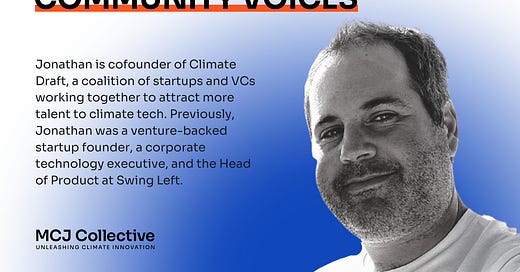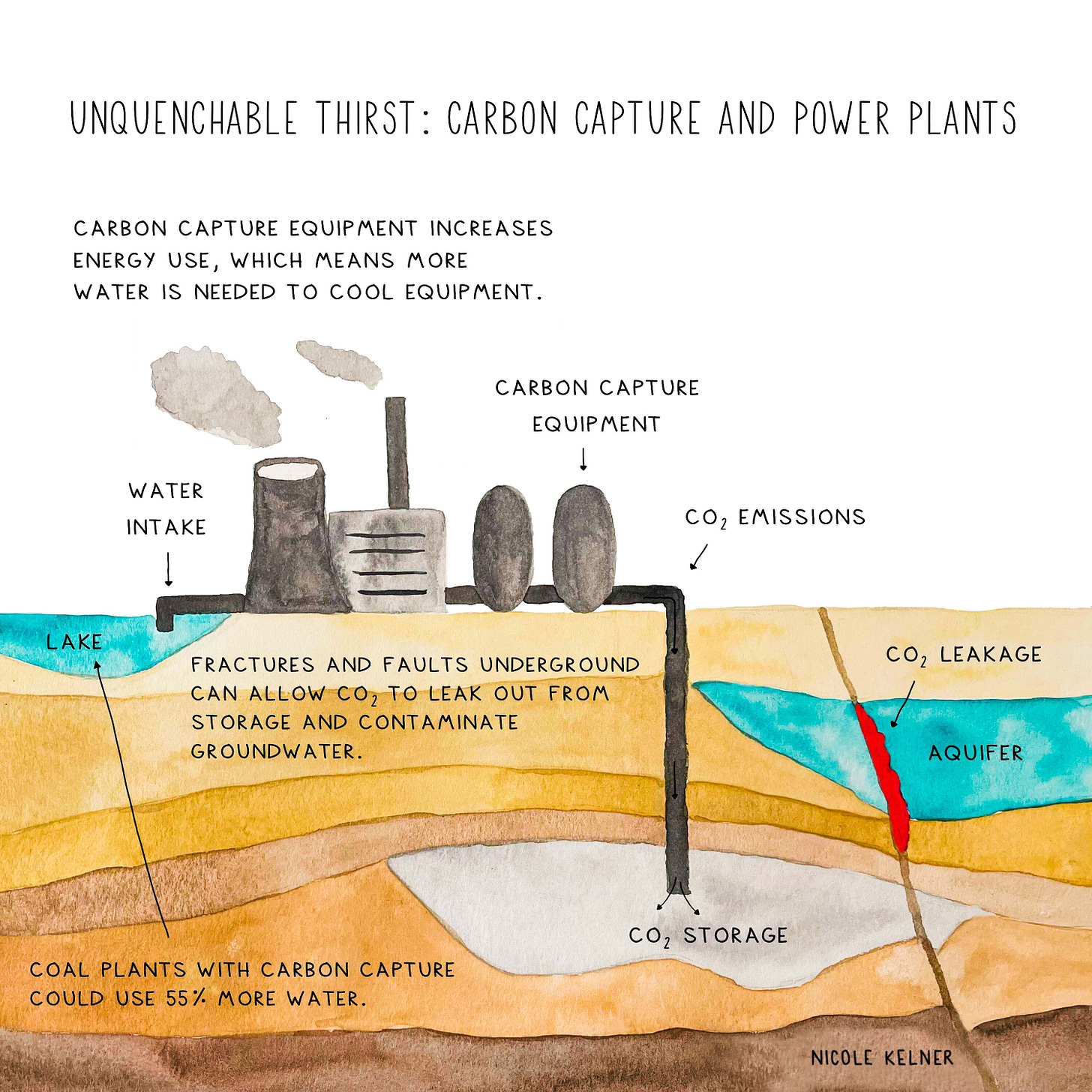Common Misconceptions for Software Engineers Switching to Climate
by Jonathan Strauss, co-founder at Climate Draft
One of the main things we hear at Climate Draft from those new to climate tech is that they’ve been given the impression that climate change is an unsolvable problem. Why should anyone work on something that’s impossible? If you’re reading this on MCJ, you already know the tremendous progress being made to decarbonize the global economy. But because climate change is a physical world phenomenon, most people still assume that the only impactful work in climate tech involves atoms and not bits. There are 25 awesome climate tech companies actively hiring software engineers through Climate Draft right now, and you can find software engineering roles at dozens more climate tech companies on the MCJ job board and Climatebase.
The next big misconception we encounter is that you have to take a pay cut to work on climate. If you’re leaving a publicly traded tech company, you’ll be taking a pay cut to go anywhere other than another publicly traded tech company. But generally there isn’t a compensation gap between climate and non-climate startups at a comparable stage. We’re currently running a software engineering draft, and we recently organized a panel of leaders who’ve made the transition from big tech into climate tech. See what our panelists had to say about climate tech compensation from their personal experience both as candidates and hiring managers:
“I was happily surprised…in climate tech, especially right now, comparing apples-to-apples with the same stage of [non-climate] startup, [compensation] should be pretty equivalent.” – Ryan Barrett (Google & Color Genomics -> NCX)
“The offers that I did get [from climate tech startups] were very competitive…and I was able to get, I would say, a pretty decent market rate salary, even for an early startup.” – Ryan Luecke (Box -> Equilibrium Energy)
“Evergrow did a benchmarking process. So we bought the datasets…to see what the market was paying, and we wanted to be in the 75th percentile there. We didn’t want people to make a hard tradeoff.” – Cassandra Xia (Google -> Evergrow)
Now you know your skills are needed in climate tech and you don’t necessarily have to sacrifice compensation to do meaningful work, but how do you get started? Many people, especially engineers, can easily get paralyzed by the breadth of choice once they start digging into climate tech and try to optimize for climate impact. The consistent advice from our panelists was to have a bias to action:
“My short answer to ‘do you need to go learn a bunch about climate before jumping in?’ is no. Most places [where] you would go work on climate that want you, want you because of what you already know in engineering and your experience. They’re not hiring you expecting that you’re some climate science expert.” – Ryan Barrett
“Look into it, do your homework. But time-bound it. And there are also maps of the space, so you don’t have to go construct your own.” – Cassandra Xia
“I joined an energy company with zero background in energy… and I’ve learned as I’ve been implementing things and working with other people. It’s kind of like a really good symbiosis between folks who’ve been in the industry for a long time but lack the software skills and me bringing the software skills. And it is this great collaboration.” – Ryan Luecke
Finally, when it comes to deciding where to work, don’t only focus on potential climate impact because there is so much important work to do and other considerations that matter:
“There’s no single silver bullet or few silver bullets for climate, it’s much more like silver buckshot. Drawdown gives 100 things, we should try to do most of them. We kind of need to try to do most of them.” – Ryan Barrett
“You probably already have an interest in one of the spaces [in climate tech]...Turns out all of these companies have software needs. So if you find an area in the broad climate tech space that interests you, dig in there.” – Ryan Luecke
“A lot of people spend time looking through the maps of the space or finding the most effective intervention, but I think practically it’s the people and the teams that you work with and how much say you’ll have in those teams and how much you’ll enjoy working on those teams. What is the additionality of *you* as the extra human joining there?’ is also something that people tend to miss.” – Cassandra Xia
So if you’re a software engineer looking to learn more about climate tech, check out our software engineering + climate tech education module at Climate Draft or contact us at hello@climatedraft.org with any questions. We urge you to heed one last piece of advice from our panelists:
“Talk to people. Do stuff. And make the switch.” – Cassandra Xia
Here are some maps of climate solutions that you can use as a starting point:
✍️ The Draw-down
Weekly climate art by our MCJ Artist-in-Residence, Nicole Kelner.
📢 Climate Action of the Week
Want to do more? Sign up for the next Climate Changemakers Hour of Action here.
The midterms are less than 30 days away, and we're still projected to lose our pro-climate majority! This week, call environmental voters in Pennsylvania for U.S. House candidates Chris Deluzio, Susan Wild, and Matt Cartwright.
🎙My Climate Journey Podcast
🎤 Jason talked with David Roberts, aka Dr. Volts, who runs the Volts newsletter and podcast. They discuss the fundamental politics ingrained in climate, and some of the solutions that are accelerating our transition away from fossil fuels.
📊 Cody caught up with Rachel Delacour, co-founder and CEO of Sweep, about how companies source scope 3 emissions data, the potential role of regulation and carbon reporting, plus Sweep’s data-driven platform.
✨ Highlight
🌍 We’ve partnered with Terra.do to host Europe’s first climate job fair on October 25th with Greentech Alliance & ClimatEU. Sign up to meet European startups that are scaling cutting-edge climate solutions (all of whom are actively hiring!)
👩💻 Climate Jobs
For more open positions, check out the #j-climatejobs channel in MCJ Slack as well as our NEW job board featuring MCJ portfolio companies.
The 2035 Initiative is hiring a Projects & Operations Coordinator and Communications & Outreach Coordinator (Job Code 7461). The Initiative uses cutting-edge empirical research, policy development, and media engagement to support transformational policy change in the United States and across the planet. (Santa Barbara, CA)
Artyc is hiring an Electrical Engineer interested in helping electrify the cold-chain. (San Mateo, CA)
Chewie Labs is seeking a Lifecycle Marketer and Communications Manager to join their stealth startup working to upend our waste system and create a more circular economy. (San Bruno, CA)
The Cool Down is looking for a Freelance Writer and Copy Editor to help more Americans feel invested in and connected to a clean future. (Remote)
Patch is hiring a Lead Product Designer to empower climate action using their platform. (San Fransisco, CA)
Populus is seeking a VP of Engineering to transform the future of transportation in cities. (San Fransisco, CA)
Rumin8 is looking for a Senior Strategy Analyst to help solve methane emissions from livestock. (Remote)
🗓 October Events
For more climate events, check out the #c-events channel in MCJ Slack.
💥 MCJ AMA US Midterms Special with Eliza & Caroline: Join us in the MCJ Community Slack to kick off our 24 hour 'Ask Me Anything' with Eliza Nemser (Climate Changemakers) and Caroline Spears (Climate Cabinet). (Starts at 8am PT on 10/18). If you’re not a MCJ member, considering joining or comment on this post with your questions!
🤝 MCJ Career Transitions Meetup: Casual monthly event designed to build a network of individuals who can learn from and support each other in their new roles. (10/19)
🍻 Seattle MCJ x WorkOnClimate Meetup: For folks in the area who want to connect around climate solutions. (10/19)
🤗 MCJ Community Welcome Call: Connect, share and learn with MCJ team and community members. (10/20)
🍁 DC Climate October Meetup: This will be a casual meetup, no set agenda. Food/drinks will be Oktoberfest themed! (10/20)
🧠 MCJ Monthly Idea Jam! Our focus is on Financial Services. Come along, listen, and share your thoughts. (10/21)
🎨 Climate Art Workshop with Nicole Kelner: This month, we’re learning how to creatively visualize benefits from the IRA. (10/25)
MCJ Climate Voices is a free weekly email curating news, jobs, My Climate Journey podcast episodes, and other noteworthy happenings in the MCJ member community.
💭 If you have feedback or items you’d like to include, feel free to reach out.
🤝 If you’d like to become an MCJ community member, apply today.







